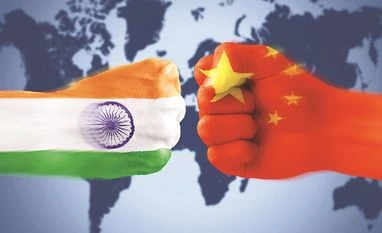Two days after People’s Daily, the mouthpiece of the Communist Party of China (CPC) posted a picture of an editorial from 1962, the year it had handed out a humiliating military defeat to New Delhi, and also warned India against “encroaching” on its territory, New Delhi on Thursday said it will continue to use diplomatic channels to resolve the stand-off between the two militaries in the Dokalam area near Sikkim.
Officials said Home Minister Rajnath Singh and External Affairs Minister Sushma Swaraj will brief leaders of prominent Opposition parties on Friday on the situation in Jammu & Kashmir and the stand-off with China.
The outreach comes in the wake of a terror attack on pilgrims of Amarnath yatra on Monday, in which six pilgrims were killed and the increasing shrillness from Beijing on the Dokalam stand-off. The government effort is to build consensus with the Opposition on the two issues with the monsoon session of Parliament beginning Monday.
The People’s Daily piece and the statements from the Chinese foreign ministry in the last two weeks, have rung alarm bells atop Raisina Hill. The People’s Daily article paraphrased pieces and editorials run by People’s Daily, Xinhua and Global Times to send out a clear message to India to accept China’s position on the current stand-off at the Sikkim border, or be prepared to face a repeat of 1962.
Headlined “If this can be tolerated, what cannot?”, the editorial from September 22, 1962, short of a month before the 1962 Sino-Indian war broke out, stated that the “Chinese people would not tolerate the provocation by the Indian Army”, according to a People’s Daily Online article titled ‘People’s Daily to India: Borderline is bottom line’.
In an echo of the current Chinese stand on the Dokalam dispute, the 1962 editorial had warned New Delhi of serious consequences if the conflict lingered. It had accused Indian troops of encroaching on Beijing’s territory.
In the past fortnight, Beijing has accused Indian troops of having “trespassed” into its Donglang (Dokalam) area. The territory is also claimed by Bhutan. “The Indian military’s trespass into Chinese territory is a blatant infringement on China’s sovereignty, which should be immediately and unconditionally rectified,” it said, noting that ever since Indian soldiers “crossed into Chinese territory” and “obstructed work on a road” in the Dokalam area in June, China has lodged a series of protests demanding India pull back its troops immediately. “India should rectify its mistakes and show sincerity to avoid an even more serious situation creating more significant consequences,” the piece said.
On Wednesday, China offered to play a “constructive” role to resolve the Kashmir dispute between India and Pakistan especially after the increased hostility along the Line of Control (LoC), a comment aimed at unsettling India which points to the Simla Agreement where New Delhi and Islamabad had agreed to resolve it bilaterally.
Today, the Ministry of External Affairs (MEA) spokesperson rejected the Chinese offer and said India’s position on addressing all issues, including Kashmir with Pakistan, in a bilateral framework, had not changed. Spokesperson Gopal Baglay said India was willing to a dialogue with Pakistan in a bilateral framework but at the heart of the matter was cross-border terrorism that threatens regional peace. He said diplomatic channels would continue to be used for a resolution of the Dokalam stand-off.
Asked about China’s comment that there was no “bilateral meeting” between Prime Minister Narendra Modi and Chinese President Xi Jinping in Hamburg, the MEA spokesperson said, “There was a conversation between them. There was a range of issues that was the subject matter of the conversation.”
The article in People’s Daily went on to term India’s “aggressive plan to encroach on our territory” as delusional. “It is well known that the McMahon Line is completely illegal and has never been recognised by successive Chinese governments. The vast area from south of the McMahon Line to the foothills of the Himalayas has historically been China’s territory,” it said.
It said Indian government didn’t desire to negotiate a peaceful settlement on the border issue. “What the Indian government pursues is to use the peace talks as a cover to encroach on China’s territory and change its status quo.”
“However, the patience of the Chinese government, the Chinese people and the Chinese border guards will not be unlimited,” the editorial said. It warned India that China will have to take the necessary precautions to protect its territory and its soldiers and India will have to take responsibility for that. “...don’t blame us that (we) didn’t warn you!” it said.
Unlock 30+ premium stories daily hand-picked by our editors, across devices on browser and app.
Pick your 5 favourite companies, get a daily email with all news updates on them.
Full access to our intuitive epaper - clip, save, share articles from any device; newspaper archives from 2006.
Preferential invites to Business Standard events.
Curated newsletters on markets, personal finance, policy & politics, start-ups, technology, and more.
)